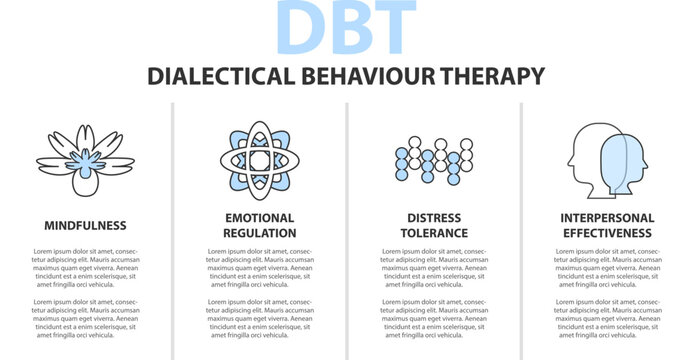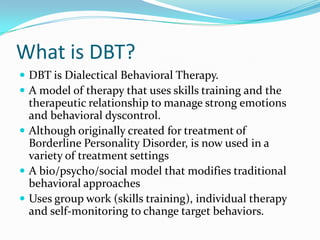Encouraging Individuals Through Reliable Dialectical Practices Therapy (DBT) Services: Building Stronger Mental Health And Wellness Foundations
In the world of mental health and health, the relevance of equipping individuals via reliable Dialectical Behavior Therapy (DBT) solutions can not be overstated. By focusing on the core concepts of DBT, such as enhancing psychological guideline skills, boosting interpersonal effectiveness, developing distress tolerance strategies, and cultivating mindfulness practices, people can embark on a journey towards structure stronger psychological health and wellness foundations.
Comprehending the Core Principles of DBT


One core concept of DBT is validation. Therapists making use of DBT acknowledge the individual's feelings and habits as legitimate reactions to their atmosphere. This recognition helps develop a solid therapeutic partnership and urges clients to function in the direction of change. One more basic aspect is dialectics, which instructs people to view circumstances from numerous perspectives and find the synthesis between conflicting ideas or feelings.
Furthermore, the concept of dialectical abstinence is central to DBT. This principle motivates people to stay away from suicidal actions while also accepting themselves. By understanding and integrating these core principles, therapists can efficiently carry out DBT strategies and assistance people in their trip in the direction of psychological law and psychological health.
Enhancing Psychological Guideline Abilities
Establishing efficiency in handling emotions is an essential element of promoting mental wellness and interpersonal efficiency - DBT London. Enhancing emotional policy skills is a core component of Dialectical Behaviour Therapy (DBT) that equips individuals with the tools to navigate intense feelings in a healthy and balanced and useful manner. Via DBT, people discover to identify, understand, and manage their emotions, resulting in improved mental health outcomes
DBT stresses the value of mindfulness, which includes existing in the minute without judgment. This method allows people to observe their feelings without becoming bewildered by them, improving their ability to react successfully as opposed to respond impulsively. By cultivating mindfulness, people can establish a greater feeling of self-awareness and emotional control.
Moreover, DBT educates practical skills such as distress resistance and feeling law methods to help people manage tough emotions. By finding out these skills, people can decrease spontaneous behavior, boost decision-making, and strengthen their partnerships with others. Eventually, boosting emotional law skills with DBT empowers people to lead more satisfying and well balanced lives.

Improving Interpersonal Effectiveness
Having established a solid structure in psychological law abilities within the structure of Dialectical Behavior Therapy (DBT), the focus now changes in the direction of boosting social efficiency. Improving interpersonal effectiveness is an important element of DBT as it gears up individuals with the necessary abilities to browse social interactions, communicate effectively, established limits, and develop healthier partnerships.
In DBT, social effectiveness skills are educated with modules that concentrate on locations such as assertiveness, efficient communication, and social analytical. By learning these abilities, people can enhance their capability to express their needs and wishes, preserve dignity, and develop more powerful connections with others.
Exercising mindfulness is an essential component of improving social effectiveness within the DBT structure. Mindfulness permits individuals to be existing in their interactions, pay attention proactively, and respond attentively as opposed to react impulsively. By including mindfulness into their every day lives, individuals can grow higher self-awareness and psychological regulation, which are crucial for successful interpersonal communications.
Building Distress Tolerance Methods
Exploring efficient methods for managing emotional distress is necessary for people seeking to improve their coping abilities and strength. Building distress tolerance methods is a critical aspect of Dialectical Behaviour Therapy (DBT) that encourages people to browse challenging emotions without ending up being overloaded - DBT London. One basic strategy in DBT for distress tolerance is the acronym "ACCEPTS," which stands for Activities, Contributing, Contrasts, Feelings, Pressing away, Ideas, and Experiences. By making use of these strategies, individuals can efficiently manage stressful scenarios and manage their psychological feedbacks.
Moreover, mindfulness techniques play a substantial duty in structure distress tolerance. Mindfulness encourages individuals to stay present in the minute without judgment, enabling them to observe their thoughts and emotions without responding impulsively. This recognition allows individuals to tolerate distress extra properly and establish a higher sense of control over their feedbacks.
Along with these methods, creating a personalized distress resistance plan with the guidance of an experienced specialist can offer individuals with a customized method to managing psychological distress - DBT London. By integrating these strategies right into life, individuals can enhance their mental wellness structures and improve their total health

Cultivating Mindfulness Practices
To strengthen their distress resistance strategies further, individuals can concentrate on cultivating mindfulness methods as a corresponding approach within the framework of Dialectical Behaviour Therapy (DBT) Mindfulness, an essential part of DBT, involves taking note of the here and now moment without judgment. By promoting mindfulness, individuals can improve their understanding of thoughts, emotions, and bodily sensations, promoting a much deeper understanding of themselves and their experiences.
Mindfulness practices in DBT include techniques such as mindful breathing, body scans, and observing thoughts without attachment. These practices urge people to create a non-reactive position in the direction of their inner experiences, permitting them to react to tough scenarios with higher clearness and composure. By incorporating mindfulness into daily regimens, people can discover to control their emotions better, decrease impulsive actions, and grow a sense of internal tranquility.
Via growing mindfulness methods, individuals undergoing DBT can construct a solid foundation for managing stress, improving partnerships, and blog here improving overall well-being. By incorporating mindfulness into their healing trip, people can establish important abilities that equip them to navigate life's obstacles with resilience and self-awareness.
Conclusion
Finally, effective Dialectical Practices Therapy (DBT) solutions play a crucial duty in encouraging individuals to construct stronger psychological health and wellness foundations. By his response comprehending the core principles of DBT, boosting emotional regulation skills, boosting interpersonal performance, developing distress resistance methods, and growing mindfulness practices, people are geared up with the essential tools to browse their emotions, connections, and challenges in a much more flexible and resilient manner. DBT solutions provide a thorough approach to advertising psychological well-being and equipping people to lead satisfying lives.
By concentrating on the core concepts of DBT, such as enhancing emotional law skills, enhancing social effectiveness, developing distress resistance strategies, and cultivating mindfulness methods, people can get started on a journey in the direction of building stronger psychological wellness structures. Enhancing psychological regulation abilities is a core part of Dialectical Behavior Treatment (DBT) that gears up individuals with the tools to navigate intense feelings in a constructive and healthy manner.Moreover, DBT educates sensible abilities such as distress resistance and emotion regulation techniques to help individuals manage difficult emotions.To strengthen their distress tolerance methods even more, individuals can focus on cultivating mindfulness practices as a complementary approach within the framework of Dialectical Behaviour Treatment (DBT) By understanding the core concepts of DBT, boosting psychological law abilities, enhancing interpersonal effectiveness, building distress resistance navigate to this website strategies, and growing mindfulness methods, individuals are geared up with the necessary tools to browse their feelings, connections, and difficulties in a more durable and adaptive manner.